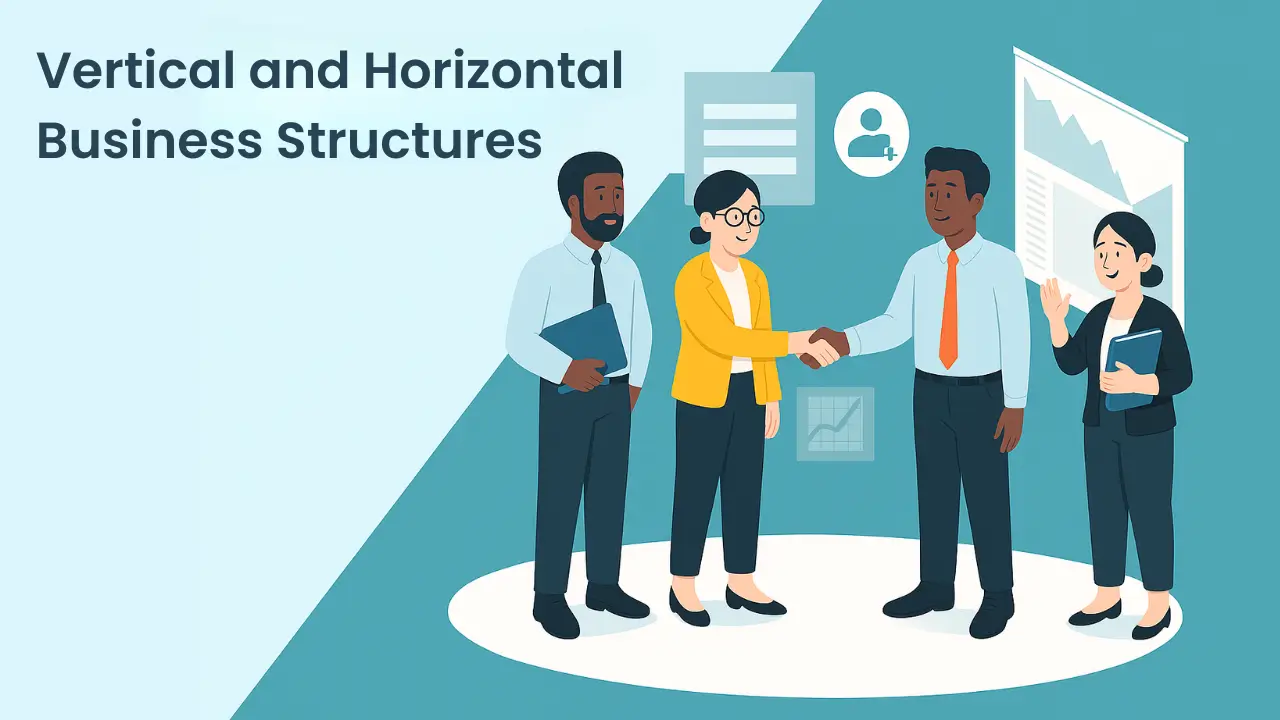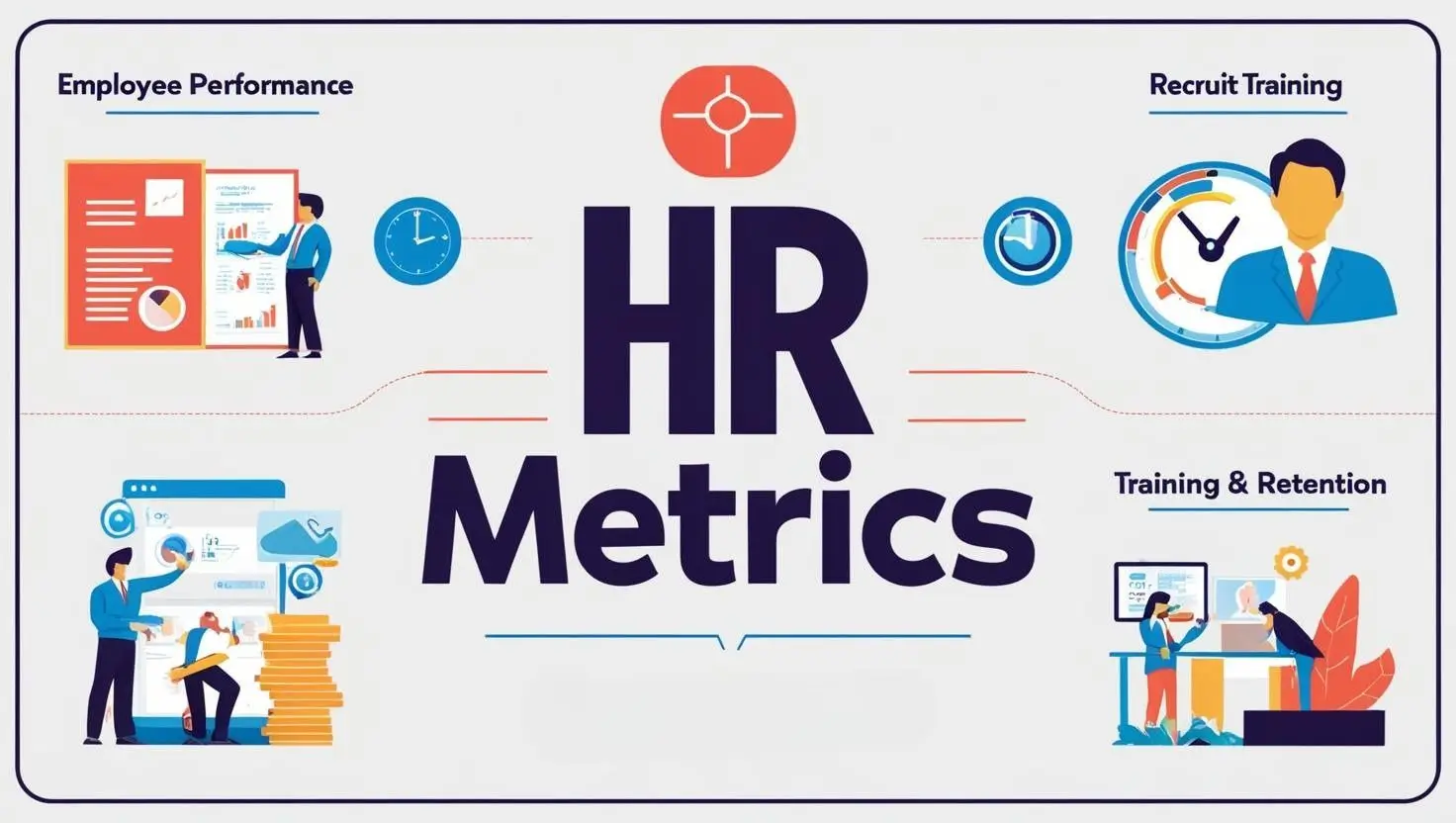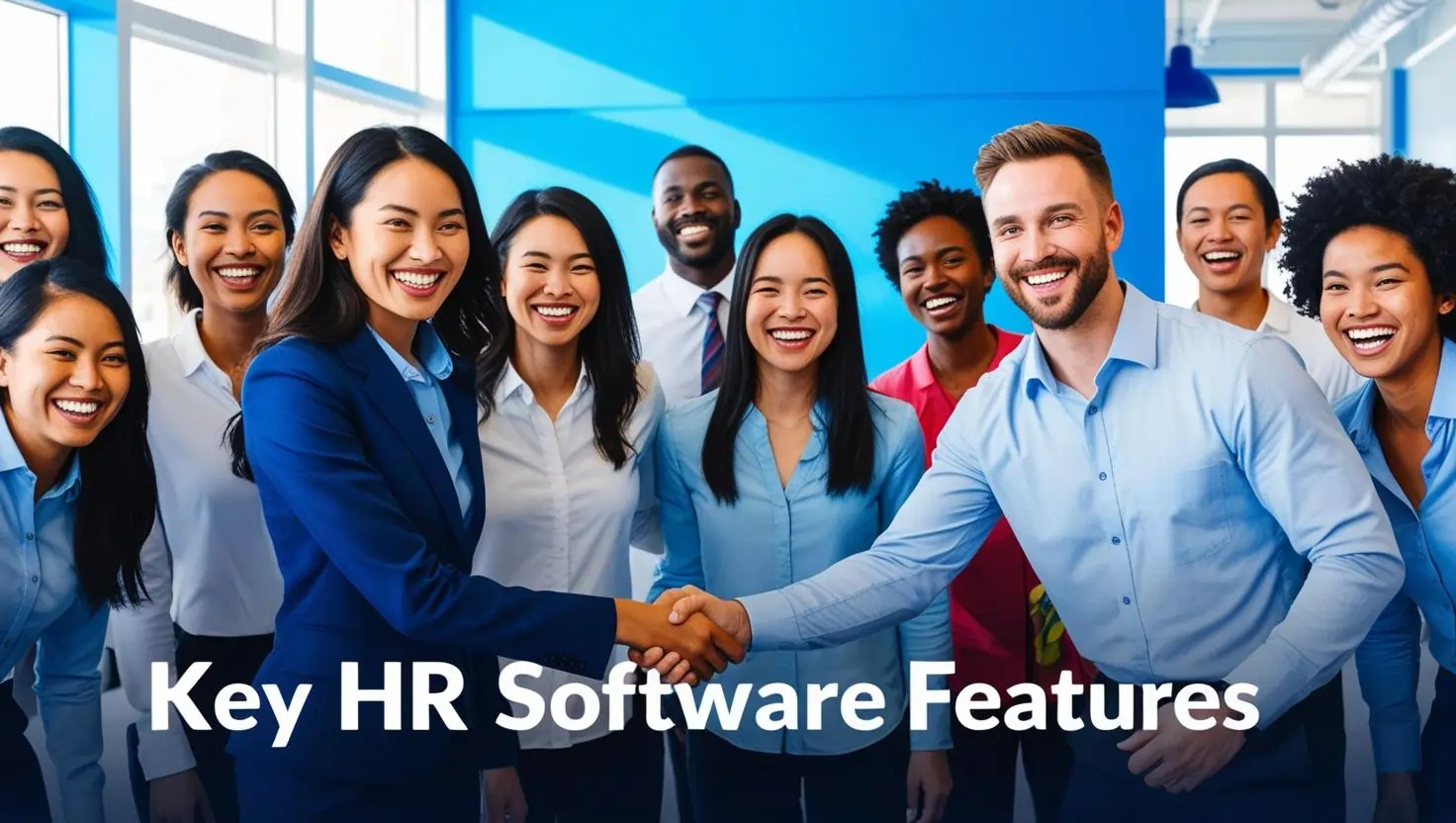Best HR Software for 2025
Last updated: September 2025
Find the best HR software that fits your business like a glove. We’ll walk you through the top-rated HR management systems and human resource software solutions—handpicked based on real user feedback, features, pricing, and overall value. These HR management solutions can help you manage people, payroll, and performance with less stress.
- Advanced analytics to track KPIs & impact
- Automates onboarding, payroll & reporting
- Designed to support fast-growing companies
- All-in-one payroll software
- Over 130+ seamless app integrations
- 24/7 Award-winning support
- Built for all businesses small to large
- Automate tax registration
- Hire and onboard remote employees
- Trusted by 40,000+ businesses
- End to end payroll and HR management
- Customized dashboards and reporting
- Award-winning payroll & HR Software
- Run payroll in a few clicks
- Payroll on Autopilot®
- Software designed for the unique needs of your business
- Seamless integration with payroll
- 24/7 customer support
- Real-time employee tracking
- Business operations one stop-shop
- Quick task management
- 2022 Best SMB-Focused Solution Winner
- 24/7 U.S. based customer support
- Flexible and automated small business payroll
- Streamlined onboarding process
- Integrations with leading HR tools
- Cost saving features
- HR experts at your fingertips in real time
- Workforce analytics
- Full workforce visibility
- 24/7 support from HR experts
- Seamless benefits & integrations
- Transparent pricing, no hidden fees
- Benefits and HR in 50 states
- Automated onboarding flows
- Online I-9 and W-4 forms
- Free 14-day trial
- Easy setup
- HR analytics & insights
What is Human Resources Software?
Human resources software (HR) is a digital tool designed to help businesses manage every part of the employee lifecycle—from hiring and onboarding to payroll, benefits, time tracking, performance reviews, and compliance.
Instead of juggling spreadsheets and disconnected tools, HR management software for small business and enterprises alike bring everything into one place. That means:
- Payroll gets done faster and with fewer errors
- Managers can track hours, approve PTO, and monitor performance in real-time
- Employees get access to self-service tools to update info, access documents, and make requests
- HR teams stay organized, efficient, and focused on strategy—not paperwork
Top platforms also support compliance, ensuring you’re up to date with labor laws, tax reporting, and industry regulations. Some even include onboarding tools, e-signatures, learning modules, and 360-degree feedback to keep your workforce engaged and informed.
Best HR Software Providers
⭐ HiBob – Best for Mid-Sized Businesses Focused on Engagement
⭐ Connecteam – Best for Non-Desk and Mobile Teams
⭐ BambooHR – Best for Intuitive UX and Performance Reviews
⭐ Justworks – Best for HR & Compliance Simplification
⭐ Gusto – Best for Small Businesses Needing All-in-One HR & Payroll
⭐ Paychex – Best for Established Businesses Requiring Scalable HR Solutions
⭐ Deel – Best for Global Hiring and Contractor Management
⭐ Paycor – Best for Talent and Performance Management
⭐ OnPay – Best for Affordable Payroll & Basic HR Tools
⭐ Rippling – Best for All-in-One HR & IT Integration
Choosing the Best HR Software for Your Business
Not all HR software is created equal. The right one depends on your size, industry, team structure, and goals.
Here’s how to find the right fit:
1. Identify Your Needs
Start by listing what you need most: payroll automation? Time tracking? Performance reviews? International compliance? Prioritize must-have features.
2. Think About Your Team Size
Some tools are perfect for startups and small teams, while others are built for large enterprises. Choose software that matches your current headcount—and can grow with you.
3. Check for Integrations
Does it work with your accounting software? Slack? Zoom? Tools you already use should play nicely with your HR platform.
4. Look for Self-Service Features
A good HR platform gives your employees access to their own data—so they can handle basic tasks without needing HR’s help.
5. Consider Support and Scalability
Is support available when you need it? Does the software offer flexibility as your team grows? What about multi-location or remote support?
When in doubt, take advantage of free trials or demos. They give you a hands-on feel for what the software can really do.
Why You Can Trust the Expertise of Sonary
At Sonary, we are committed to providing accurate and trustworthy information to help you make informed decisions. Our research process is meticulous, transparent, and guided by a dedication to maintaining the highest standards of integrity, ensuring accurate, real-world insights.
Read more
Unlike many other review platforms, we conduct in-depth evaluations of the software and services we feature. Our expert team tests and actively uses the tools we review to understand their features, performance, and value comprehensively. Our assessments are based on real-world use, giving you insights beyond surface-level descriptions. Our research methodology includes analyzing key consumer factors such as pricing, functionality, device usability, scalability, customer support quality, and unique industry-specific features. This hands-on approach and dedication to transparency mean you can trust Sonary to deliver regular, up-to-date content and recommendations that are well-researched and genuinely helpful for your business needs.Top HR Management Software Solutions for Every Business Size
HiBob – Best for Mid-Sized Businesses Focused on Engagement
HiBob offers a people-first HR platform with powerful tools for performance tracking, engagement, and people analytics. It’s built for modern, mid-sized companies that prioritize culture and retention.
 Advanced analytics to track KPIs & impact
Advanced analytics to track KPIs & impact  Automates onboarding, payroll & reporting
Automates onboarding, payroll & reporting Key Features:
- Customizable employee profiles and org charts
- Talent and performance management tools
- Time and attendance tracking
- Global payroll integrations
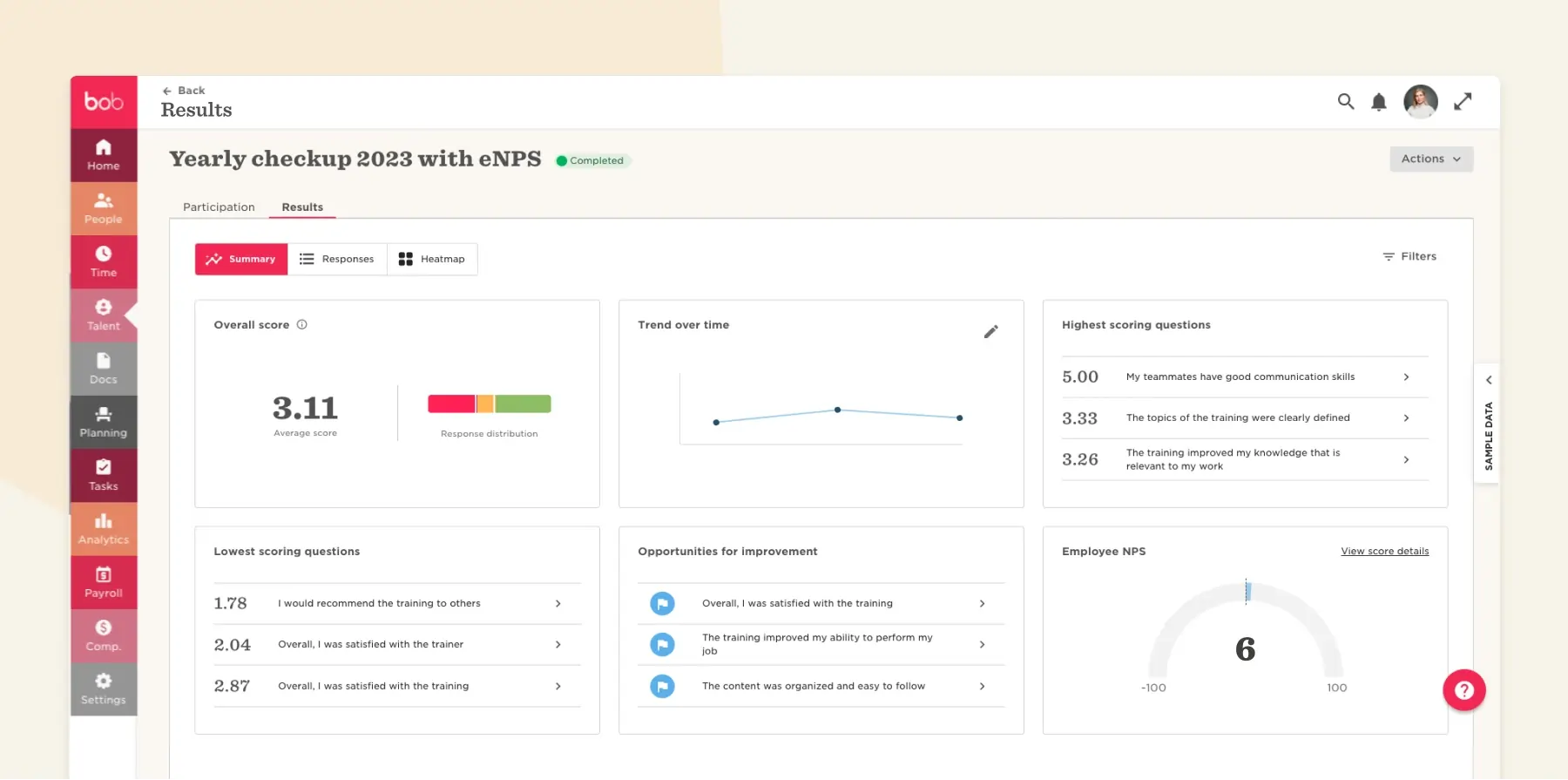
Connecteam – Best for Non-Desk and Mobile Teams
Connecteam is perfect for small businesses with frontline workers in industries like retail, construction, and hospitality. It’s mobile-first and packed with features to manage, schedule, and communicate with teams on the go.
 Real-time employee tracking
Real-time employee tracking  Business operations one stop-shop
Business operations one stop-shop Key Features:
- Time tracking and GPS-enabled scheduling
- Internal communication and task management
- Employee onboarding and training tools
- Custom workflows for HR tasks
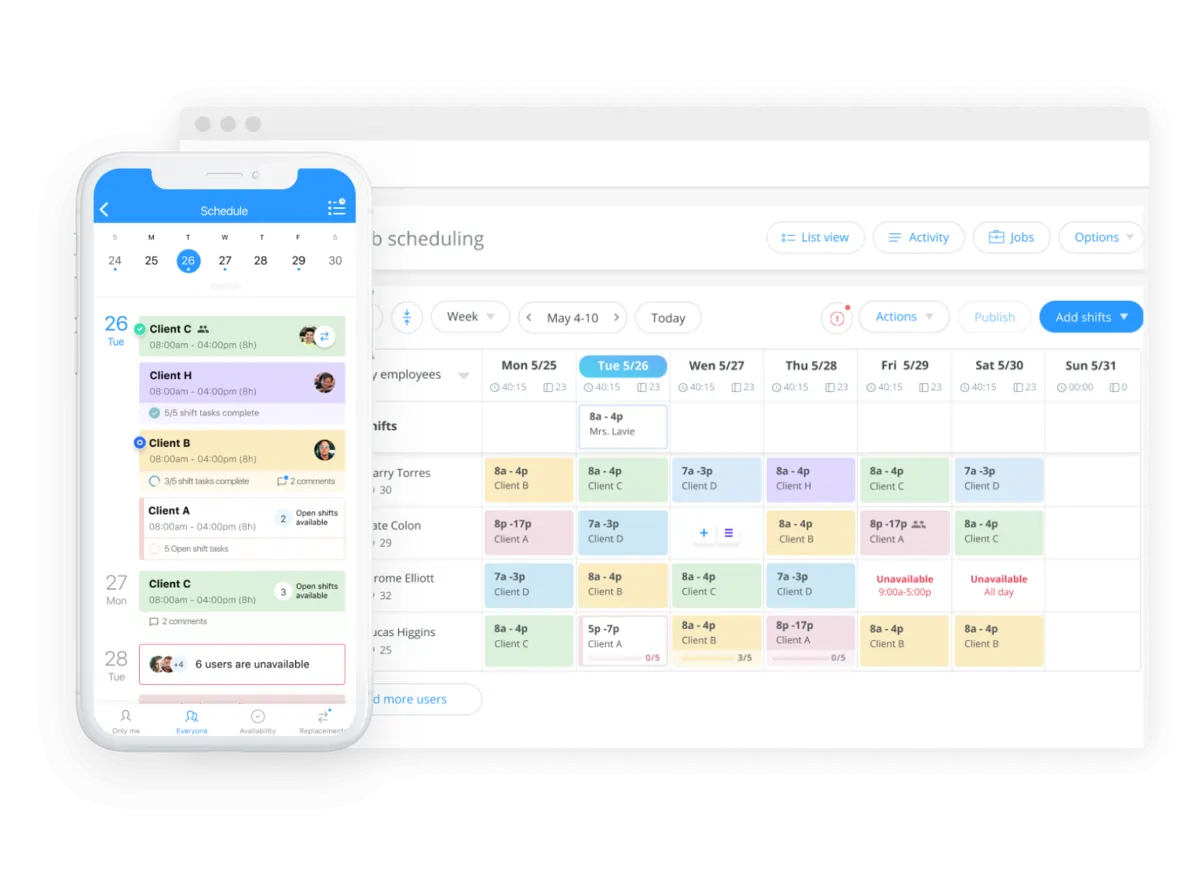
BambooHR – Best for Intuitive UX and Performance Reviews
BambooHR is known for its simplicity, clean design, and strong performance management features—perfect for small to midsize teams.
 All-in-one payroll software
All-in-one payroll software  Over 130+ seamless app integrations
Over 130+ seamless app integrations Key Features:
- Employee records and time tracking
- Onboarding checklists and e-signatures
- 360-degree performance reviews
- Employee engagement surveys
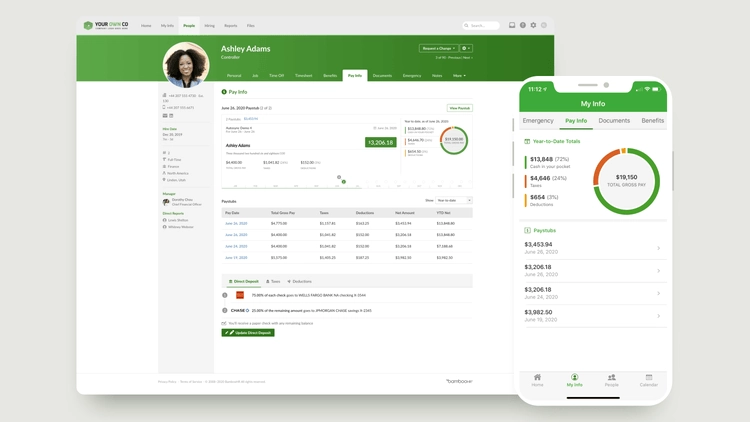
Justworks – Best for HR & Compliance Simplification
Justworks is a PEO-based HR platform designed to simplify payroll, benefits, and compliance for growing teams.
 24/7 support from HR experts
24/7 support from HR experts  Seamless benefits & integrations
Seamless benefits & integrations Key Features:
- Full-service payroll with tax filing
- Health insurance and 401(k) benefits management
- Automated compliance with labor laws
- HR consulting and live support
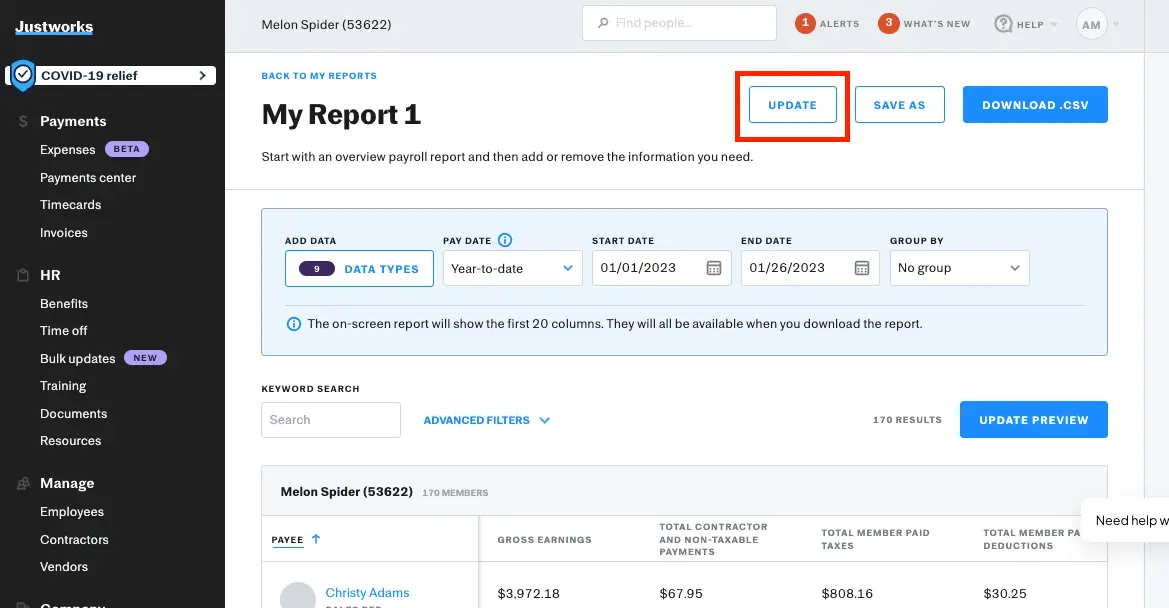
Gusto – Best for Small Businesses Needing All-in-One HR & Payroll
Gusto combines payroll, HR, and benefits in a sleek, easy-to-use platform built for small and mid-sized teams.
 Award-winning payroll & HR Software
Award-winning payroll & HR Software  Run payroll in a few clicks
Run payroll in a few clicks Key Features:
- Full-service payroll with tax automation
- Health and financial benefits management
- Employee self-onboarding and document e-signing
- Performance tracking and reporting
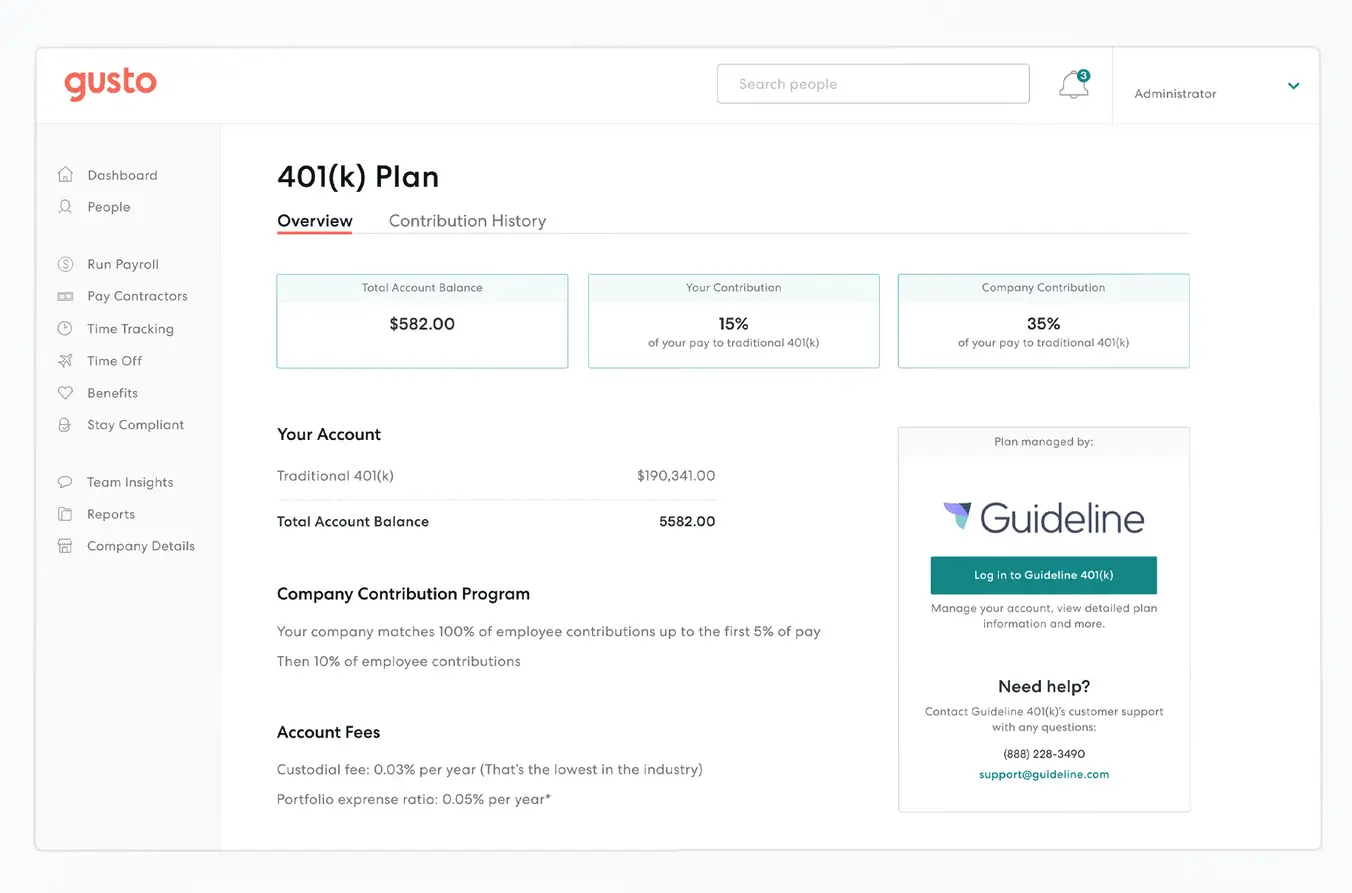
Paychex – Best for Established Businesses Requiring Scalable HR Solutions
Paychex offers flexible HR solutions for businesses of all sizes, with strong payroll tools and add-ons for growing teams.
 2022 Best SMB-Focused Solution Winner
2022 Best SMB-Focused Solution Winner  24/7 U.S. based customer support
24/7 U.S. based customer support Key Features:
- Payroll and tax filing services
- Employee benefits and 401(k) integration
- HR analytics and benchmarking tools
- Dedicated account manager
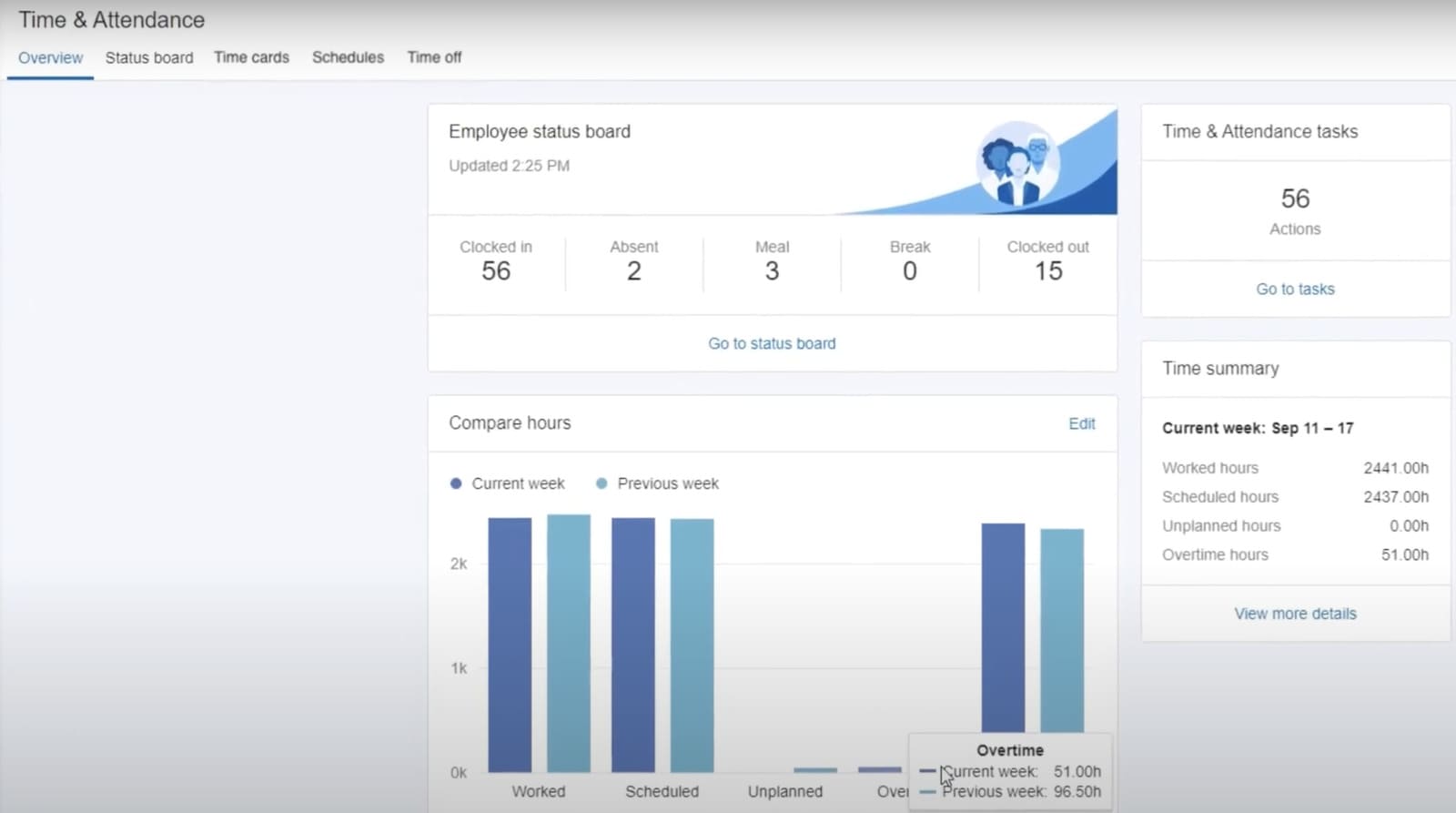
Deel – Best for Global Hiring and Contractor Management
Deel makes international hiring seamless, supporting payroll and compliance in 150+ countries with zero local entities needed.
 Streamlined onboarding process
Streamlined onboarding process  Integrations with leading HR tools
Integrations with leading HR tools Key Features:
- Employer of record (EOR) services
- Contractor and employee onboarding worldwide
- Global payroll and benefits management
- Built-in compliance and legal support
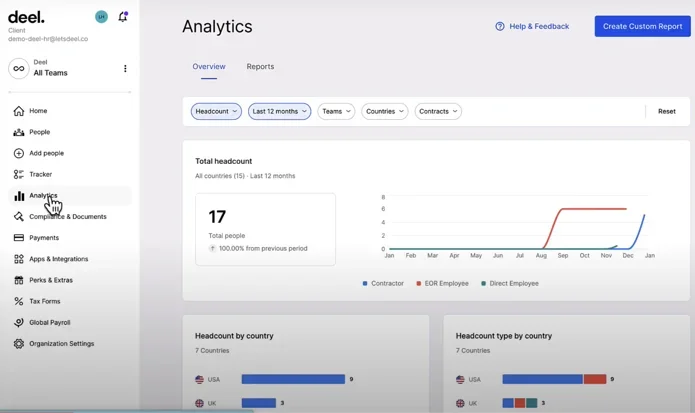
Paycor – Best for Talent and Performance Management
Paycor provides HR tools with a focus on performance tracking, employee development, and analytics.
 Trusted by 40,000+ businesses
Trusted by 40,000+ businesses  End to end payroll and HR management
End to end payroll and HR management Key Features:
- Custom performance review templates
- Goal setting and tracking
- Payroll and HR automation
- Workforce analytics dashboard
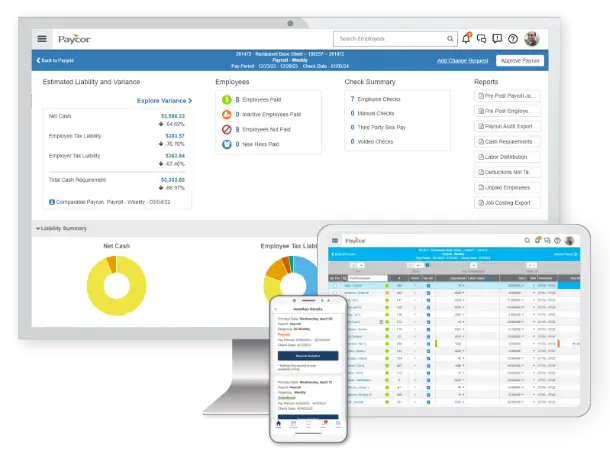
OnPay – Best for Affordable Payroll & Basic HR Tools
OnPay is an ideal pick for small businesses wanting a budget-friendly solution for payroll and HR basics.
 Benefits and HR in 50 states
Benefits and HR in 50 states  Automated onboarding flows
Automated onboarding flows Key Features:
- Unlimited payroll runs and automated tax filings
- Employee self-service portal
- PTO tracking and compliance support
- Simple benefit administration
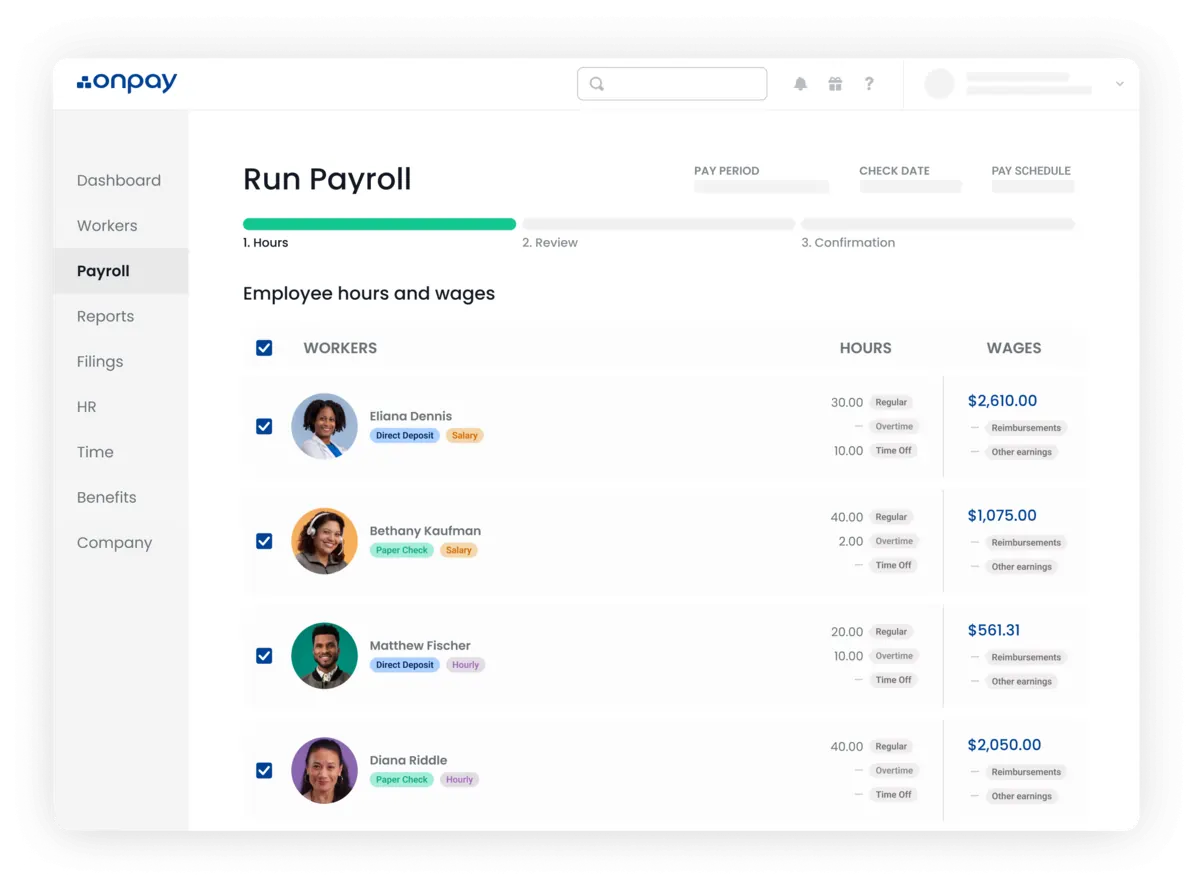
Rippling – Best for All-in-One HR & IT Integration
Rippling combines HR, IT, and finance in one powerful platform, making it a smart choice for fast-growing or tech-savvy teams.
 Built for all businesses small to large
Built for all businesses small to large  Automate tax registration
Automate tax registration Key Features:
- Global payroll and benefits administration
- Device and app management for remote teams
- Modular HR suite (add or remove tools as needed)
- Workflow automation and custom analytics
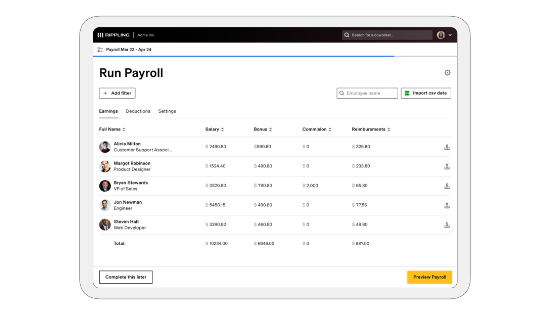
Types of HR Software
HR software comes in different forms, and understanding the core differences of HR management systems can help you choose the right one for your organization. Here’s a deeper look at the main types, what they offer, and which business types they’re best suited for:
1. Human Resource Information System (HRIS)
Best for: Small to medium-sized businesses needing core HR capabilities.
An HRIS is primarily a centralized database used to manage employee data and automate routine HR tasks. It focuses on record-keeping and reporting, with some support for basic HR operations.
Key Features:
- Employee data management
- Payroll processing
- Benefits administration
- Time and attendance tracking
- Compliance management
- Basic reporting and analytics
- Self-service employee portals
HRIS platforms are ideal for businesses that want a cost-effective way to streamline essential HR operations without unnecessary complexity.
2. Human Resource Management System (HRMS)
Best for: Midsize businesses needing broader HR management solutions.
HRMS platforms build on HRIS functionality by adding features that support employee engagement, recruitment, and performance management. These systems provide a more complete picture of HR operations and make it easier for HR professionals to manage dynamic workforces.
Key Features:
- All HRIS features, plus:
- Recruiting and applicant tracking system (ATS)
- Onboarding workflows
- Learning and development modules
- Performance reviews and feedback
- Compensation management
- Advanced analytics and dashboards
- Custom workflows for approvals and HR tasks
HRMS solutions are great for businesses growing past the basics and needing a better handle on people operations.
3. Human Capital Management (HCM)
Best for: Large enterprises seeking strategic, data-driven HR management systems.
HCM software includes everything in an HRMS, but adds strategic tools for long-term workforce planning and alignment with company goals. These platforms integrate with ERP, CRM, and business intelligence systems.
Key Features:
- All HRMS features, plus:
- Predictive workforce analytics
- Succession planning
- Talent acquisition and retention strategy tools
- DEI tracking and compliance
- Benchmarking and labor market data
- Global workforce management
- Multi-country payroll support
- Integration with ERP/CRM platforms
HCM platforms are built for enterprise-scale operations and companies looking to align HR strategy with company-wide performance.
💡 Pro Tip: These terms—HRIS, HRMS, and HCM—are often used interchangeably by vendors. Don’t rely on the label alone. Always check the feature list to confirm what the platform actually includes.
Essential HR Software Features
The best HR platforms come packed with features that streamline your operations and make life easier for everyone. Here are the must-haves:
- Payroll – Automates salary processing, tax filings, and compliance so your employees are paid accurately and on time.
- Benefits Administration – Simplifies benefits setup and compliance with regulations like ACA and COBRA.
- Automatic Alerts & Reminders – Keeps your HR team on track with reminders for onboarding, payroll runs, and document updates.
- E-Signatures – Streamlines hiring and documentation workflows—no need to chase paperwork or scan documents.
- Mobile Access – Gives employees access to key HR features on the go, like clocking in/out, submitting time-off requests, or checking schedules.
These features not only make HR easier for you but also improve the employee experience from day one
Company Size Considerations
When choosing HR software, your company’s size and future growth plans matter. Here’s how to think about it:
- Small Businesses (under 200 employees) – Look for easy-to-use HRIS or lightweight HRMS tools.
- Midsized Businesses (200 – 1000 employees) – Consider modular or scalable platforms like Paycor, Rippling, or UKG that let you add features as you grow.
- Enterprise Businesses (1000+ employees) – Invest in robust HCM platforms like SAP SuccessFactors, Workday, or UKG Pro with advanced analytics, workforce planning, and custom integrations.
Planning for the future? Choose a system that can scale with your workforce and budget.
Software Integrations
Your HR software should play well with your existing tools—whether it’s accounting, project management, or communications apps.
- Built-In Integrations – Many systems like Rippling or BambooHR offer plug-and-play integrations with popular apps.
- Custom Integrations via API – Some platforms allow your IT team to build tailored connections between your HR system and others.
- Watch for Compatibility Issues – Always confirm integration capabilities with tools you already use—especially if you’re only using some modules of a system (like payroll from one vendor, and time tracking from another).
Smooth integration = less manual data entry and fewer errors.
How Much Does HR Software Cost?
Pricing for HR software can vary widely based on the features, number of employees, and level of customization. Some vendors are transparent, others require a custom quote. Here’s what to expect:
- Low-cost tiers (starting at ~$1.50–$10 per user/month)
- Mid-range ($10–$30 per user/month)
- Enterprise pricing ($30+ per user/month or quote-based)
💡 Pro Tip: Always ask about setup fees, annual discounts, and if free trials or demos are available before committing.
Conclusion
Whether you’re a startup or an enterprise, investing in the best HR systems can make a huge impact. These top HR software tools are designed to streamline everything from payroll to performance reviews.
Take time to review the HRMS software options listed above, explore demos, and find the system that matches your company’s size, goals, and growth stage.
Empower your team with tools that scale, automate, and support your success. Your business deserves the best.

